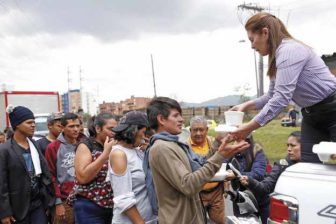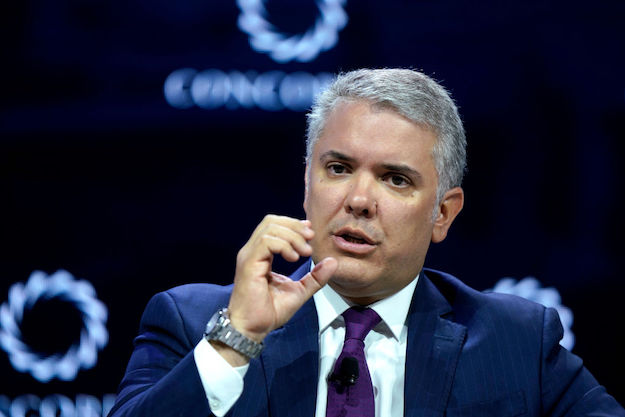On December 9, the mayor of Bogotá, Gustavo Petro, was removed and disqualified from holding public office for 15 years by the inspector general of Colombia, Alejandro Ordóñez, as a result of “irregularities in the public service of garbage-collection.”
The inspector general’s decision, however, violates the American Convention on Human Rights, ratified by Colombia in 1973. According to Article 23(2) of the Convention, a person may only be deprived of his political rights upon conviction in a judicial process that meets all due process safeguards. Specifically, the “sentencing by a competent court in criminal proceedings” standard is a guarantee against the suspension or arbitrary deprivation of political rights of individuals, including the right to vote and to hold elective office.
This very stringent standard was confirmed in 2011 by the Inter-American Court of Human Rights (López Mendoza v. Venezuela), when the Court analyzed the case of a former opposition mayor, Leopoldo López Mendoza, who was disqualified from holding public office for 6 years by decision of the comptroller general of Venezuela, who found him guilty of corruption. Legal authority for these sanctions came from Article 105 of the Organic Law of the Comptroller General.
Similarly, in Colombia, the Código Disciplinario Unico (Unique Disciplinary Code) authorizes the inspector general to impose the penalty of “dismissal and general disqualification” in cases of a “disciplinary offense” with “serious intent” or “serious misconduct.” After 11 months of disciplinary proceedings, Ordóñez found Petro guilty of alleged “irregularities” in a 2012 garbage-collection service he implemented in Bogotá that temporarily dismissed private garbage collection contractors.
Petro’s case is not an isolated one. Since 2009, Ordóñez has removed 23 members of the Colombian Congress. In 2012 alone, he imposed disciplinary sanctions on 152 mayors, 177 local councilmen, nine governors, five senators, two deputies and one representative to the House.
This kind of dismissal defies the language in the Colombian constitution (in Articles 98 and 122), which establishes that a person may be disqualified from holding office only if “convicted for crimes against the public treasury.” In spite of this explicit clause, in October 2013, Colombia’s Constitutional Court ruled this procedure constitutional, confirming the sanction against Senator Piedad Córdoba, who in 2010 was dismissed from office and disqualified for 18 years. Given this precedent, any appeal by Mayor Petro can be expected to fail (whether before the inspector general himself, an administrative judge, or the Constitutional Court).
In Venezuela (as in Colombia), the Constitution (Articles 42 and 65) limits the “suspension of political rights” to cases where there is a “final court ruling,” or upon conviction for crimes “committed while in office.” As in Colombia, Venezuela’s Supreme Court ratified in 2008 the comptroller’s decision, disqualifying López Mendoza from office—thus exhausting all domestic remedies and allowing for a claim before the Inter-American Commission on Human Rights and, eventually, the Inter-American Court of Human Rights in San José, Costa Rica.
As the case was being heard in Costa Rica, the Human Rights Foundation (HRF) filed an amicus curiae brief requesting the Court to ratify the stringent standard of Article 23(2) of the American Convention on Human Rights. On September 1, 2011, the Court ordered Venezuela to “set aside” the resolutions against López Mendoza, and to adapt Venezuelan law to the Convention’s standard. Penning a concurring opinion, Judge Eduardo Vio Grossi said it “is clear, simple and categorical” that political rights can be suspended “only” by “sentence by a competent court in criminal proceedings.”
Today, Chile, Mexico and Peru have similar laws to those in Colombia and Venezuela that curtail political rights through non-judicial decisions. Responding to one of Venezuela’s arguments, Judge Vio Grossi clarified “that the fact that the legislations of [only] some States Parties to the Convention … provide that a noncriminal body may impose the sanction of disqualification, in no way reflects that it is a practice that ‘establishes the agreement of the parties regarding its interpretation’.”
Venezuela’s main argument was that the suspension of the former mayor was an effort to “fight against corruption,” thus fulfilling its obligations under the Inter-American Convention Against Corruption—an argument that has been frequently used by the Colombian inspector in his decisions. Judge Vio Grossi explained that while this treaty “provides for the obligation … to criminalize acts of corruption, nowhere [does it] contemplate that the penalty for that offense may be imposed by an administrative body, from which follows that [it does not] in any way … amend or interpret the provisions of the Convention, but precisely the opposite.”
In 2008, polls placed López Mendoza as a favorite to be elected mayor of Caracas against the candidate of then-President Hugo Chávez, who for years built a competitive authoritarian government that up to this day wins elections that are neither free (voting against chavismo invites reprisals by the government) nor fair (electoral rules are stacked against the opposition). Defiantly, the government of Venezuela not only disobeyed the Court’s judgment, but in 2012 denounced the Convention, withdrawing completely from the Inter-American human rights system.
In Colombia, Petro was elected mayor of Bogotá in 2011, taking office in 2012, and has since governed democratically, in spite of his violent past (of which he is unapologetic) as a member of the M-19 guerrilla group.
International law provides that neither Petro nor López Mendoza—nor any democratically-elected official in the Americas—can be removed or disqualified through a simple decision of a comptroller or inspector, but only upon a court decision finding the official guilty of a crime.
Democratic countries like Colombia must ensure that the fight against corruption or administrative incompetence is carried out in strict compliance with international human rights standards. Otherwise, the very important line distinguishing democracies from dictatorships can start to fade away quickly. Colombia must adhere to the rule of law, and give the mayor of Bogotá his job back.
Javier El-Hage is the international legal director and Alejandro Gutiérrez is the legal associate at the New York-based Human Rights Foundation.








